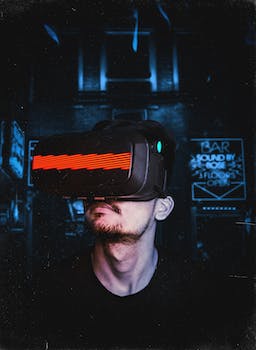-
Table of Contents
“Unleash the Power of Blockchain: Gaming Redefined”
Introduction
Revolutionary blockchain-powered games are shaping the future of gaming by introducing decentralized and transparent systems that enhance player ownership, security, and monetization. These games utilize blockchain technology to create immutable and verifiable records of in-game assets, transactions, and player interactions. By eliminating the need for intermediaries and enabling peer-to-peer interactions, blockchain-powered games empower players with true ownership of their digital assets and provide opportunities for new forms of gameplay, virtual economies, and revenue generation. This emerging trend has the potential to revolutionize the gaming industry, offering a more inclusive and equitable gaming experience for players worldwide.
The Impact of Blockchain Technology on the Gaming Industry
The gaming industry has always been at the forefront of technological advancements, constantly pushing the boundaries of what is possible. In recent years, one technology has emerged as a potential game-changer for the industry: blockchain. Blockchain technology, most commonly associated with cryptocurrencies like Bitcoin, has the potential to revolutionize the gaming industry in ways we could never have imagined.
So, what exactly is blockchain? At its core, blockchain is a decentralized and transparent digital ledger that records transactions across multiple computers. This technology eliminates the need for intermediaries, such as banks or payment processors, and allows for secure and transparent transactions. The decentralized nature of blockchain ensures that no single entity has control over the network, making it resistant to censorship and fraud.
The impact of blockchain technology on the gaming industry is already being felt. One of the most significant changes is the ability to create and trade in-game assets using blockchain technology. Traditionally, in-game assets were owned and controlled by the game developers, with players having no ownership rights. However, with blockchain, players can now truly own their in-game assets, as they are stored on the blockchain and can be traded freely.
This has opened up a whole new world of possibilities for gamers. Players can now buy, sell, and trade in-game assets with other players, creating a vibrant and decentralized marketplace. This has led to the rise of blockchain-powered games, where players can earn real-world value by playing the game and acquiring rare and valuable in-game assets. This has the potential to disrupt the traditional gaming industry, where players spend countless hours grinding for in-game items that hold no real-world value.
Another area where blockchain technology is making waves in the gaming industry is in the realm of digital ownership and scarcity. With blockchain, developers can create limited-edition digital assets that are truly scarce and cannot be replicated. This has led to the rise of blockchain-based collectible games, where players can collect and trade unique digital items. These items can range from virtual pets to digital artwork, and their scarcity and uniqueness are guaranteed by the blockchain.
Blockchain technology also has the potential to address some of the long-standing issues in the gaming industry, such as cheating and fraud. By using blockchain, game developers can create transparent and tamper-proof systems that ensure fair play and prevent cheating. Additionally, blockchain can be used to verify the authenticity of in-game items, eliminating the risk of counterfeit items flooding the market.
The impact of blockchain technology on the gaming industry is still in its early stages, but the potential is immense. As more developers and players embrace blockchain, we can expect to see a shift towards more decentralized and player-centric gaming experiences. Players will have true ownership over their in-game assets, and developers will have new ways to monetize their games.
In conclusion, blockchain technology is shaping the future of the gaming industry in ways we could never have imagined. From creating a decentralized marketplace for in-game assets to ensuring fair play and preventing fraud, blockchain has the potential to revolutionize the gaming industry. As more developers and players embrace this technology, we can expect to see a new era of gaming where players have true ownership and control over their gaming experiences. The future of gaming is blockchain-powered, and the possibilities are endless.
How Blockchain-Powered Games are Revolutionizing In-Game Economies

Blockchain technology has been making waves in various industries, and the gaming sector is no exception. With its decentralized and transparent nature, blockchain has the potential to revolutionize in-game economies, creating a more immersive and fair gaming experience for players.
One of the key advantages of blockchain-powered games is the ability to tokenize in-game assets. Traditionally, players would spend countless hours grinding and accumulating virtual items, only to find that they have no real-world value. However, with blockchain, these items can be tokenized and traded on decentralized marketplaces. This means that players can now truly own their in-game assets and have the freedom to buy, sell, or trade them as they please.
This tokenization of in-game assets also opens up new opportunities for players to earn real-world income through gaming. By participating in blockchain-powered games, players can accumulate valuable assets and sell them to other players for cryptocurrencies. This has created a whole new economy within the gaming world, where players can monetize their skills and time spent in-game.
Furthermore, blockchain technology ensures transparency and fairness in in-game economies. In traditional games, developers have full control over the distribution and scarcity of in-game items. This often leads to situations where certain items become extremely rare and valuable, creating an unfair advantage for players who are lucky enough to obtain them. However, with blockchain, the scarcity and distribution of in-game assets can be governed by smart contracts, ensuring a more balanced and equitable gaming experience for all players.
Another aspect of blockchain-powered games that is shaping the future of gaming is the concept of play-to-earn. In traditional games, players invest their time and effort into the game without any tangible rewards. However, with blockchain, players can earn cryptocurrencies or other valuable assets by simply playing the game. This has the potential to attract a whole new demographic of players who are looking for ways to earn income while enjoying their favorite games.
Blockchain technology also addresses the issue of fraud and cheating in online gaming. In traditional games, cheating and fraud are rampant, with players using hacks or exploits to gain an unfair advantage. However, with blockchain, the decentralized nature of the technology makes it extremely difficult for cheaters to manipulate the game. The transparency and immutability of blockchain ensure that all transactions and actions within the game are recorded and cannot be tampered with.
Moreover, blockchain-powered games have the potential to create a more collaborative and community-driven gaming experience. With the ability to tokenize in-game assets, players can now collaborate and pool their resources to achieve common goals. This opens up new possibilities for cooperative gameplay and fosters a sense of community among players.
In conclusion, blockchain-powered games are revolutionizing in-game economies by tokenizing assets, creating new income opportunities, ensuring fairness, and addressing issues of fraud and cheating. The future of gaming is being shaped by this revolutionary technology, offering players a more immersive, transparent, and rewarding gaming experience. As blockchain continues to evolve, we can expect to see even more innovative and groundbreaking games that will redefine the way we play and interact in virtual worlds.
Exploring the Potential of Decentralized Gaming Platforms with Blockchain Technology
Blockchain technology has been making waves in various industries, and the gaming sector is no exception. With its decentralized nature and ability to provide secure and transparent transactions, blockchain has the potential to revolutionize the gaming industry. In this article, we will explore the potential of decentralized gaming platforms powered by blockchain technology and how they are shaping the future of gaming.
One of the key advantages of blockchain-powered games is the ability to create a decentralized gaming ecosystem. Traditional gaming platforms are often controlled by a central authority, which can lead to issues such as censorship, lack of transparency, and limited control for players. However, with blockchain technology, games can be built on decentralized platforms, allowing for a more democratic and transparent gaming experience.
Blockchain-powered games also offer players true ownership of in-game assets. In traditional games, players spend countless hours and money acquiring virtual items, only to find that they have no real ownership or control over them. With blockchain, players can have true ownership of their in-game assets, as they are stored on the blockchain and cannot be altered or taken away by anyone, including the game developers.
Furthermore, blockchain technology enables the creation of unique and scarce digital assets. In traditional games, virtual items can be easily replicated, leading to an oversupply and devaluation of these items. However, with blockchain, each digital asset can be tokenized and given a unique identifier, ensuring scarcity and value. This opens up new possibilities for players to trade and sell their digital assets in a secure and transparent manner.
Another exciting aspect of blockchain-powered games is the potential for decentralized governance. In traditional games, decisions regarding game updates, rules, and monetization strategies are made by the game developers, often without much input from the players. However, with blockchain technology, governance can be decentralized, allowing players to have a say in the development and direction of the game. This creates a more inclusive and community-driven gaming experience.
Blockchain-powered games also have the potential to address issues of cheating and fraud. In traditional games, cheating and fraud are common problems that can ruin the gaming experience for honest players. However, with blockchain technology, transactions and game data are recorded on the blockchain, making it nearly impossible to cheat or manipulate the game. This ensures a fair and secure gaming environment for all players.
Furthermore, blockchain-powered games can enable new revenue models for developers and players. With blockchain, developers can create in-game economies where players can earn cryptocurrency or other digital assets by playing the game. This opens up new opportunities for players to monetize their gaming skills and for developers to generate revenue through the sale of in-game items and services.
In conclusion, blockchain-powered games have the potential to revolutionize the gaming industry by creating decentralized and transparent gaming platforms. These platforms offer players true ownership of in-game assets, unique and scarce digital assets, decentralized governance, and a fair and secure gaming environment. Furthermore, they enable new revenue models for developers and players. As blockchain technology continues to evolve, we can expect to see more innovative and exciting games that harness the power of blockchain to shape the future of gaming.
Q&A
1. What are revolutionary blockchain-powered games?
Revolutionary blockchain-powered games are video games that utilize blockchain technology to enhance gameplay, enable player ownership of in-game assets, and provide transparent and secure transactions.
2. How do blockchain-powered games shape the future of gaming?
Blockchain-powered games have the potential to revolutionize the gaming industry by introducing decentralized ownership, enabling players to truly own and trade in-game assets, fostering player-driven economies, and enhancing security and transparency in transactions.
3. What are the benefits of blockchain-powered games?
Some benefits of blockchain-powered games include increased player ownership and control over in-game assets, reduced fraud and cheating, enhanced security and transparency in transactions, and the potential for players to earn real-world value from their in-game achievements.
Conclusion
In conclusion, revolutionary blockchain-powered games have the potential to shape the future of gaming. The integration of blockchain technology offers various benefits such as decentralized ownership, secure transactions, and transparent gameplay. These games provide players with true ownership of in-game assets, enabling them to trade and monetize their virtual possessions. Additionally, blockchain-powered games can foster a more inclusive and fair gaming environment by eliminating fraudulent activities and ensuring transparency. As the technology continues to evolve, it is likely that blockchain-powered games will play a significant role in shaping the future of the gaming industry.

